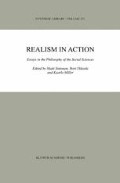Abstract
There is a familiar argument showing that games in finite extensive-form always resolve for ideally rational and well-informed players. An example which is often used is the game G 1 where player 1 has the first choice at point l a between taking either action l I or action r 1 , player 2 has the next choice at l b between R and L and finally player 1 has the last choice at l c between l 2 and r 2 . The payoffs of the players are marked in the picture. The assumption that the players are well informed is interpreted in different ways by different authors. The standard interpretation, at least until few years ago, has been that the conditions of the game and the fact that the players are rational is common belief (or knowledge) among the players, where the notion of common belief is understood in the usual way as an infinite conjunction: each believes, and each believes that each believes, etc. With this assumption, the proof that at each round of the game the players defect seems to go by the following backward induction argument:
-
(i)
In the last round player 1 will defect (i.e., choose l 2 ), given his beliefs about the actions available to him and the corresponding payoffs, and the fact that he is rational.
-
(ii)
In the next-to-last round, from the common belief assumption player 2 will be able to reduplicate player’s 1 beliefs in the last round, and so he will end up with the belief that player 1 will defect in the last round. Hence, given the fact he is rational, he will defect too (i.e., will choose L).
-
(iii)
In the first round player 1 will believe that he will act rationally in the last round and that player 2 is rational in the next-to-last round and also believes in that round that player 1 will act rationally in the last round. Therefore, in the first round player 1 will believe that he will defect in the last round and that player 2 will defect in the next-to-last round. Hence, being rational, he will defect (i.e., choose l 1) in the first round.
Access this chapter
Tax calculation will be finalised at checkout
Purchases are for personal use only
Preview
Unable to display preview. Download preview PDF.
References
Bicchieri, C.: 1989, “Self-refuting Theories of Strategic Interaction: A Paradox of Commonn Knowledge”, Erkenntnis, 30, 69–85.
Bicchieri, C.: 1992, “Knowledge-Dependent Games: Backward Induction”, in C. Bicchieri and M. L. Dalla Chiara (eds.), Knowledge, Belief, and Strategic Interaction, Cambridge University Press, Cambridge, pp.327–343.
Bicchieri, C.: 1993, Rationality and Coordination, Cambridge University Press, Cambridge.
Fagin, R., J. Y. Halpern, Y. Moses, and M. Y. Vardi: 1995, Reasoning About Knowledge, MIT Press, Cambridge, Mass.
Pettit, P. and R. Sugden: 1989, “The Backward Induction Paradox”, The Journal of Philosophy, 4, 169–182.
Sobel, J. H.: 1994, Taking Chances. Essays on Rational Choice, Cambridge University Press, Cambridge.
Author information
Authors and Affiliations
Editor information
Editors and Affiliations
Rights and permissions
Copyright information
© 2003 Springer Science+Business Media Dordrecht
About this chapter
Cite this chapter
Sandu, G. (2003). The Backward Induction Paradox and Epistemic Logic. In: Sintonen, M., Ylikoski, P., Miller, K. (eds) Realism in Action. Synthese Library, vol 321. Springer, Dordrecht. https://doi.org/10.1007/978-94-007-1046-7_4
Download citation
DOI: https://doi.org/10.1007/978-94-007-1046-7_4
Publisher Name: Springer, Dordrecht
Print ISBN: 978-94-010-3775-4
Online ISBN: 978-94-007-1046-7
eBook Packages: Springer Book Archive

